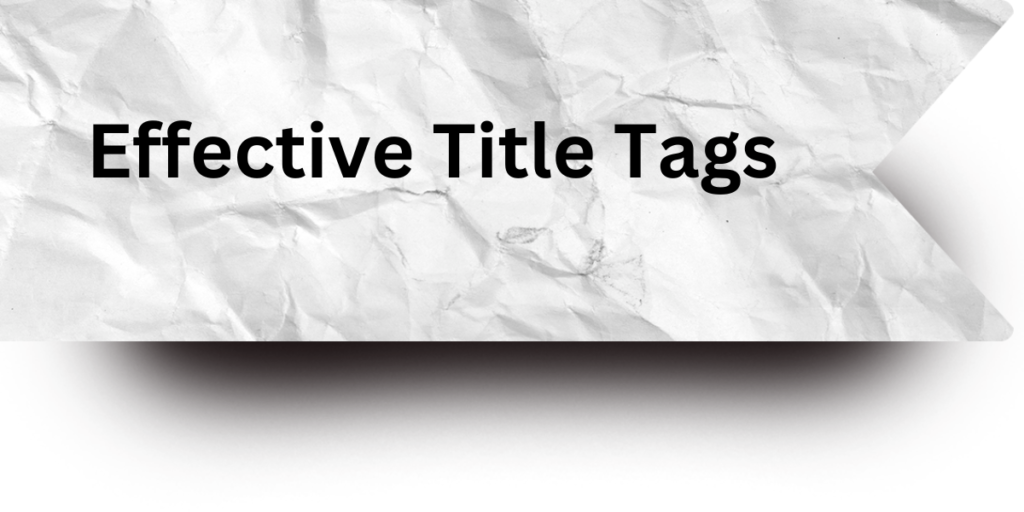Introduction
At Finest Seo Agency, we understand the importance of creating compelling meta tags that not only attract search engine attention but also entice users to click through to your website. In this comprehensive guide, we will share our expertise on writing meta tags that can outrank other websites and significantly boost your click-through rates (CTR).

Understanding Meta Tags
Meta tags are snippets of HTML code that provide information about a web page to search engines and website visitors. While there are several types of meta tags, including meta descriptions and title tags, we will focus on these two key elements as they have a direct impact on search engine rankings and CTR.
Also Check The Ultimate Guide to Achieving Top SEO Rankings for E-commerce Websites 2023
Crafting Engaging Meta Descriptions
Meta descriptions serve as concise summaries of web page content and appear as snippets in search engine results. Writing compelling meta descriptions is crucial for capturing the attention of users and encouraging them to click on your website. Here are some essential tips for crafting engaging meta descriptions:
- Be Relevant: Ensure that your meta description accurately reflects the content of the page. Avoid misleading descriptions that might disappoint users.
- Include Targeted Keywords: Incorporate relevant keywords that align with the page’s content and target audience’s search queries. This helps search engines understand the context of your page and improves its visibility.
- Focus on Benefits: Highlight the unique value proposition or benefits users can gain by clicking on your page. By emphasizing the value they will receive, you increase the likelihood of attracting their attention.
- Maintain Optimal Length: While there is no strict character limit for meta descriptions, it’s best to keep them between 150-160 characters to ensure they appear fully in search results. This prevents truncation, allowing users to grasp the essence of your content at a glance.
- Include a Call-to-Action (CTA): Incorporate a clear and persuasive CTA at the end of your meta description to prompt users to take action. Examples include “Learn more,” “Discover now,” or “Get started.”
Mastering Effective Title Tags
Title tags are HTML elements that define the title of a web page and appear as clickable links in search engine results. A well-crafted title tag can significantly impact both search engine rankings and CTR. Here’s how you can master the art of writing effective title tags:

- Be Concise and Descriptive: Create a succinct title that accurately summarizes the content of the page while piquing the curiosity of users. Use relevant keywords naturally within the title tag to improve its visibility in search results.
- Front-load Important Keywords: Place the most important keywords at the beginning of the title tag to ensure they are immediately visible to both search engines and users. This enhances the relevance and click-worthiness of your title tag.
- Add Branding, When Appropriate: If your brand carries significant recognition or influence, consider including it in the title tag to boost brand visibility. This is particularly valuable for well-established companies or recognizable brands.
- Maintain a Reasonable Length: To prevent truncation in search results, keep your title tag within 50-60 characters. This ensures that users can read the entire title and understand what your page offers.
- Use Emotional Triggers: Infuse your title tag with emotional triggers that evoke curiosity, excitement, or urgency. By appealing to users’ emotions, you can significantly increase the likelihood of them clicking on your website
Research and Identify Target Keywords
Before you begin optimizing your meta tags, it is essential to conduct thorough keyword research. Identify relevant keywords that align with your target audience’s search intent. Utilize keyword research tools to discover popular search terms and long-tail keywords that have a reasonable search volume and low competition. This step forms the foundation of your meta tag optimization strategy.

Analyze Competitor Meta Tags
To outrank other websites, it’s crucial to understand what your competitors are doing. Analyze the meta tags of competing web pages that rank highly in search engine results for your target keywords. Identify their strengths and weaknesses, and take note of any unique approaches they have taken in crafting their meta descriptions and title tags. This analysis will help you identify opportunities for differentiation and improvement.
Craft Unique and Compelling Meta Descriptions
Once you have gathered insights from your keyword research and competitor analysis, it’s time to craft unique and compelling meta descriptions. Consider the following guidelines:
- Uniqueness: Create distinct meta descriptions for each page to avoid duplicate content issues and ensure search engines understand the individual value of each page.
- Relevance: Make sure your meta descriptions accurately represent the content on the page. Align your descriptions with the users’ search intent to increase the likelihood of them clicking through.
- Engagement: Use persuasive language and power words to captivate users’ attention. Highlight the benefits, solutions, or information users can expect to find on your page.
- Formatting: Utilize proper grammar, sentence structure, and punctuation to ensure readability and professionalism. Avoid excessive capitalization or gimmicky symbols.

Optimize Title Tags with Targeted Keywords
Title tags play a vital role in both SEO and attracting user clicks. Optimize your title tags with targeted keywords while keeping them compelling and concise. Follow these best practices:
- Keyword Placement: Incorporate your primary keyword at the beginning of the title tag for maximum impact. However, ensure it flows naturally and does not appear forced.
- Clarity and Relevance: Clearly convey what your page offers in the title tag. Use concise language that resonates with your target audience’s search intent.
- Brand Integration: Include your brand name in the title tag when appropriate. This can enhance brand recognition and credibility, especially if your brand is well-known.
- Avoid Keyword Stuffing: While it’s important to include relevant keywords, avoid stuffing the title tag with excessive keywords. This can lead to a poor user experience and potential penalties from search engines.
Implement Meta Tags on Your Website
Once you have crafted compelling meta descriptions and optimized title tags, it’s time to implement them on your website. Ensure that each web page has a unique meta description and title tag that accurately reflects its content. Update the HTML code of your pages to incorporate the meta tags, placing the meta description within the <head> section and the title tag within the <title> tags.

Monitor Performance and Adjust
Meta tag optimization is an ongoing process. Regularly monitor the performance of your meta tags through website analytics tools and search engine performance reports. Analyze click-through rates, bounce rates, and conversions to gain insights into the effectiveness of your meta tags. Make necessary adjustments to improve their performance and increase your website’s visibility.
- A/B Testing: Conduct A/B tests by creating variations of your meta descriptions and title tags. Monitor the performance of each variation to identify the ones that generate higher click-through rates and better user engagement. Continuously refine and optimize your meta tags based on the results.
- Stay Updated: Keep abreast of the latest SEO trends and search engine algorithm updates. Search engines constantly evolve, and staying informed will help you adapt your meta tag strategies accordingly.
- User Feedback: Pay attention to user feedback, such as comments, reviews, and social media mentions. User sentiment can provide valuable insights into the impact and effectiveness of your meta tags.
- Competitor Analysis: Regularly analyze your competitors’ meta tags to identify any new strategies or trends. Stay ahead of the competition by incorporating innovative approaches into your own meta tag optimization process.
Conclusion
Crafting compelling meta tags is a critical aspect of SEO that can significantly impact your website’s search engine rankings and click-through rates. By following the strategies outlined in this article, you can enhance the visibility of your web pages, outrank competitors, and attract more organic traffic. Remember to continually monitor and refine your meta tags based on performance data and user feedback to stay ahead in the ever-evolving digital landscape.
Now that you have a comprehensive understanding of writing meta tags that boost click-through rates, it’s time to implement these strategies on your website and witness the positive impact they can have on your online presence. Take control of your meta tags and watch your search engine rankings soar!

Here are some frequently asked questions (FAQs) regarding meta tags and their impact on search engine optimization:
Q: What are meta tags?
A: Meta tags are snippets of HTML code that provide information about a web page to search engines and website visitors. They include meta descriptions, which summarize the page content, and title tags, which define the title of the page.
Q: Why are meta tags important for SEO?
A: Meta tags play a crucial role in SEO because they help search engines understand the content and relevance of a web page. Well-crafted meta tags can improve search engine rankings, increase click-through rates, and attract more organic traffic to your website.
Q: What is the difference between meta descriptions and title tags?
A: Meta descriptions provide a concise summary of the page content and appear as snippets in search engine results. Title tags define the title of the page and appear as clickable links in search engine results. While both are important for SEO, they serve different purposes in conveying information to users.
Q: How can I write compelling meta descriptions?
A: To write compelling meta descriptions, ensure they accurately reflect the page content, include relevant keywords, and highlight the unique value or benefits users can gain by clicking on your page. Keep them between 150-160 characters to prevent truncation and include a persuasive call-to-action (CTA) to encourage users to click through.
Q: What are some best practices for optimizing title tags?
A: When optimizing title tags, focus on being concise and descriptive, front-loading important keywords, maintaining a reasonable length (50-60 characters), and using emotional triggers to evoke curiosity or urgency. Also, consider adding branding when appropriate to enhance brand visibility.
Q: Should I use the same meta descriptions and title tags for every page on my website?
A: It’s best to create unique meta descriptions and title tags for each page on your website. This helps search engines understand the individual value of each page and avoids duplicate content issues. Tailor the meta tags to accurately represent the content and purpose of each specific page.
Q: How often should I update my meta tags?
A: Meta tag optimization is an ongoing process. It’s recommended to monitor the performance of your meta tags regularly and make adjustments based on the data. Additionally, stay informed about SEO trends and search engine algorithm updates to ensure your meta tags remain effective and aligned with best practices.
Q: Can meta tags guarantee a higher search engine ranking?
A: While well-optimized meta tags are an important factor for SEO, they are not the sole determinant of search engine rankings. Many other factors, such as content quality, backlinks, and site structure, influence rankings. However, properly optimized meta tags can significantly improve your website’s visibility and click-through rates.
Q: Are there any penalties for improperly optimized meta tags?
A: Improperly optimized meta tags, such as keyword stuffing or misleading descriptions, can negatively impact user experience and may violate search engine guidelines. While there are no specific penalties for meta tags alone, search engines may lower the ranking of your website if they deem your meta tags manipulative or irrelevant to the page content.
Q: How can I track the performance of my meta tags?
A: You can track the performance of your meta tags through website analytics tools like Google Analytics. Monitor metrics such as click-through rates, bounce rates, and conversions to gain insights into the effectiveness of your meta tags. Use this data to make informed decisions and further optimize your meta tags for better results.